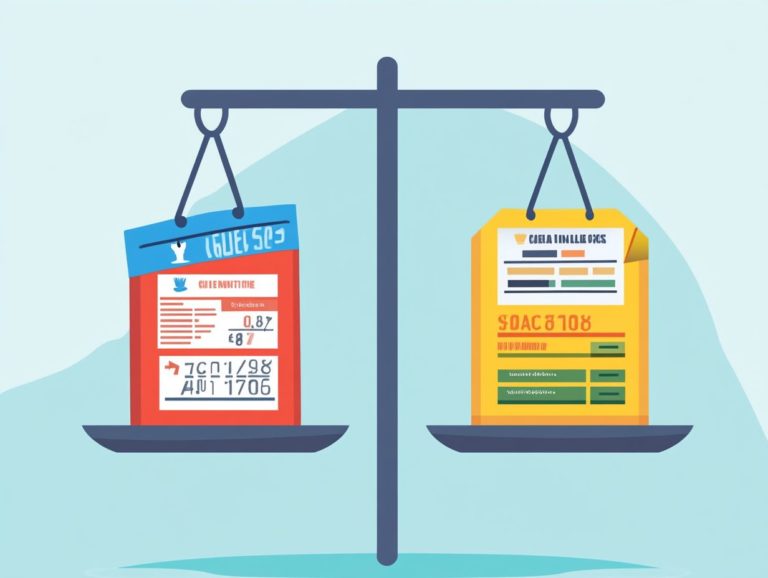5 Tips for Efficient Car Comparison
Choosing the right car can indeed feel overwhelming, especially with an abundance of options at your fingertips.
Whether you’re venturing into your first purchase or contemplating an upgrade, grasping your needs and prioritizing essential features is crucial. Get ready! This guide reveals five essential tips that will transform how you compare cars. These tips will help you identify what truly matters, assess total ownership costs, and evaluate performance.
It also highlights common pitfalls to avoid and offers guidance on finding trustworthy reviews. Prepare to make an informed decision on your next ride!
Contents
- Key Takeaways:
- 1. Determine Your Needs and Priorities
- 2. Research and Compare Features
- 3. Consider the Total Cost of Ownership
- 4. Test Drive and Compare Performance
- 5. Read Reviews and Compare Reliability
- What Are the Key Factors to Consider When Comparing Cars?
- Frequently Asked Questions
- What Are the Benefits of Using 5 Tips for Efficient Car Comparison?
- How Can I Use These Tips to Make Car Comparison Easier?
- What Are Some Common Mistakes to Avoid When Comparing Cars?
- How Can I Use Online Resources to Compare Cars More Efficiently?
- What Factors Should I Consider When Comparing Cars?
- How Can These Tips Help Me Find the Perfect Car for My Needs?
Key Takeaways:

- Determine your needs and priorities before comparing cars to find the best fit for your lifestyle and budget.
- Thoroughly research and compare features to ensure you are getting the most value for your money.
- Consider the total cost of ownership, including factors like insurance and maintenance, to understand long-term expenses.
1. Determine Your Needs and Priorities
Determining your needs and priorities is the first step when buying a new car. This helps you identify essential features like fuel efficiency and safety attributes.
Evaluate personal priorities like fuel economy. These factors help establish a realistic budget and influence your choice of energy-efficient vehicles, whether you’re leaning toward hybrids or electric models.
If you commute regularly or enjoy long drives, hybrids might strike the perfect balance between economy and range for your lifestyle. If you have a larger family or need extra cargo space, electric SUVs could offer both efficiency and spaciousness.
Taking the time to thoughtfully consider these aspects empowers you to make informed decisions.
2. Research and Compare Features
Researching and comparing car models is essential for you as a car buyer. This allows you to evaluate safety features, technology advancements, and reliability ratings.
Utilizing consumer reports and reputable online platforms can significantly enhance your research. These resources provide detailed insights into the latest advancements in automotive safety and technologies.
It’s important to explore emissions reduction metrics and compare efficiency ratings. By selecting vehicles that promise safety and meet the latest efficiency standards, you contribute to long-term sustainability.
3. Consider the Total Cost of Ownership
Considering the total cost of ownership is essential for you as a car buyer. This concept includes maintenance costs, fuel efficiency, and savings over time key elements in your decision-making process.
With rising fuel prices and unexpected trips to the mechanic, expenses can escalate rapidly. Evaluating a vehicle’s fuel efficiency becomes vital.
For instance, hybrids and electric vehicles can offer significant long-term savings thanks to lower fuel costs and minimal maintenance needs. The reliability of these models impacts both your immediate purchase and your future expenses.
Consider the vehicle’s carbon footprint. Choosing environmentally friendly options resonates with your personal values and may lead to potential tax incentives.
By selecting models known for consistent performance and lower emissions, you can secure better financial outcomes over time.
4. Test Drive and Compare Performance

Test driving and comparing performance are essential steps for car buyers.
This process helps assess the driving experience and evaluate fuel economy.
Understanding how the number of cylinders in the engine influences performance is vital, especially in hybrid vehicles and diesel engines.
During test drives, pay attention to how the car handles in various conditions.
Notice the stability and responsiveness on tight corners or uneven surfaces.
Comfort is also critical; note how the seats feel and how much cabin noise affects your driving experience.
Since each person’s driving style is unique, assessing whether the vehicle’s acceleration and braking feel intuitive is crucial.
Look at factors like horsepower, torque, and fuel efficiency when comparing models, as these metrics can reveal significant differences, ensuring you make informed decisions tailored to your preferences.
5. Read Reviews and Compare Reliability
Dive into reviews and reliability ratings they’re key to making a smart purchase!
This process offers valuable insights into the long-term performance of various automotive choices and can greatly influence both resale value and your confidence in the purchase.
To make informed decisions, consult consumer reports that aggregate feedback from real owners.
These reports illuminate common issues and strengths, guiding you through the often murky waters of car buying.
Many automotive enthusiasts recommend exploring reputable automotive forums and specialized review sites, where users share their experiences in detail.
Understanding a vehicle’s maintenance history can reveal patterns that impact its reliability over time.
A well-documented maintenance record usually indicates that the previous owner took good care of the vehicle, which often results in fewer problems and a longer lifespan.
By blending these insights, you can confidently choose a trustworthy vehicle.
What Are the Key Factors to Consider When Comparing Cars?
When you’re comparing cars, several key factors should be at the forefront of your mind, including fuel efficiency, advanced safety features, and the overall driving experience. To ensure a seamless process, consider following these 5 tips for a smooth new car purchase experience.
Each of these elements plays a pivotal role in emissions reduction and long-term savings, making them essential considerations as you navigate the automotive landscape.
Understanding these factors can greatly influence your decision-making process.
Fuel efficiency has emerged as a top priority for many, especially in today s world where environmental concerns are front and center.
Electric and hybrid models often take center stage in this arena, appealing to eco-conscious consumers like yourself.
On the safety front, features such as adaptive cruise control and lane-keeping assist not only enhance a vehicle’s attractiveness but also demonstrate a commitment to passenger protection, which resonates particularly well with families and regular commuters.
Then there s the driving experience itself defined by comfort, handling, and responsiveness.
This is where you might find yourself leaning toward performance-oriented models, while others may gravitate toward SUVs built for rugged terrains and family-oriented needs, highlighting the remarkable diversity within the automotive market.
What Are the Most Important Features to Compare?
When comparing cars, it’s essential to evaluate key features like fuel economy, high-tech safety features, and the latest enhancements in usability. Additionally, being aware of potential costs can save you from surprises; consider these 5 tips for finding hidden car fees. These elements significantly impact your comfort and overall experience.
Fuel economy is a game-changer for your wallet. It also affects your cost of ownership directly, allowing you to cover more miles without endless stops at the pump perfect for those long road trips where every minute counts!
Advanced safety features, like automatic emergency braking and adaptive cruise control, not only boost your confidence behind the wheel but also play a pivotal role in preventing accidents, ensuring the safety of you and your passengers.
Technology improvements, including easy-to-use entertainment systems and seamless smartphone integration, elevate your driving experience by offering effortless connectivity.
When combined, these exciting innovations transform your driving experience, ultimately leading to greater long-term satisfaction on the road.
How Can One Determine the Total Cost of Ownership?

Determining the total cost of ownership requires analyzing various factors, including maintenance costs, fuel efficiency, and energy consumption. This process gives you the power to establish a budget that aligns with your long-term savings objectives.
To understand your financial situation better, consider the purchase price as your initial investment, along with depreciation rates that can significantly influence resale values over time.
Insurance expenses add another layer to the overall cost, fluctuating based on your chosen model and driving history. Fuel costs, heavily impacted by the vehicle’s efficiency, play a critical role in your daily operating expenses.
As a potential buyer, it’s essential to gather data on these elements, perhaps leveraging the best online resources for car comparisons to make well-informed decisions when evaluating different car models.
What Are Some Tips for Test Driving and Comparing Performance?
When you’re test driving vehicles, consider various aspects of the driving experience, including performance comparison, comfort, and how well each car aligns with your unique driving style.
To make a truly informed decision, pay close attention to the vehicle’s handling; observe how it responds to twists and turns in the road. Visibility is another essential factor; a thoughtfully designed dashboard and clear sightlines significantly boost your driving confidence and safety.
Evaluating the comfort level of the seats and available space helps you determine if the vehicle meets your daily needs, especially for longer journeys. All these elements play a vital role in your overall satisfaction with the vehicle, guiding you toward a car that ensures a delightful driving experience.
How Can One Find Reliable Reviews for Car Comparison?
Finding reliable reviews for car comparisons is essential for making informed decisions. You can tap into resources like consumer reports, automotive magazines, and online forums to gather valuable insights about safety features, fuel efficiency, and performance.
To navigate this vast sea of information, it’s crucial to discern credible reviews from those that might lead you astray. One effective strategy is to cross-reference multiple sources, allowing you to develop a well-rounded perspective.
By examining opinions across various platforms, you can identify patterns and assess the consistency of reported experiences. This diligence enables you to filter out biased or overly positive reviews, ensuring your final decision is grounded in comprehensive, accurate data rather than isolated or exaggerated claims.
What Are the Common Mistakes to Avoid When Comparing Cars?
Car buyers often stumble into common pitfalls when comparing vehicles, like forgetting to set a realistic budget and overlooking must-have features. It’s also essential to thoroughly assess fuel economy and maintenance costs, and knowing how to utilize online price comparisons for cars can help avoid these mistakes.
These oversights can lead to financial strain or, worse, regret over your vehicle choice as time goes on. You should conduct thorough research before stepping foot in a dealership. This means understanding the overall amount you’ll spend on a car, which includes everything from insurance to repair expenses. Don t forget to consider the practical aspects of the cars you re eyeing.
Gaining self-awareness about your driving habits and personal needs will dramatically boost your decision-making power, ensuring that the vehicle you choose aligns perfectly with your lifestyle. If you prioritize these steps, you will confidently navigate the exciting car-buying journey!
Frequently Asked Questions

What Are the Benefits of Using 5 Tips for Efficient Car Comparison?
Using these tips can help you save time and money by narrowing down your options and learning how to compare car prices effectively to find the best car for your needs.
How Can I Use These Tips to Make Car Comparison Easier?
By following these tips, such as the 5 tips for first-time new car buyers, you can organize your research and prioritize the most important factors for your car purchase.
What Are Some Common Mistakes to Avoid When Comparing Cars?
Some common mistakes include only focusing on price, not considering long-term costs, and not test driving multiple options.
How Can I Use Online Resources to Compare Cars More Efficiently?
You can use online tools such as car comparison websites and virtual test drives to compare multiple cars at once and gather information quickly.
What Factors Should I Consider When Comparing Cars?
Some important factors to consider include budget, fuel efficiency, safety ratings, warranty, and features.
How Can These Tips Help Me Find the Perfect Car for My Needs?
By using these tips, you can narrow down your options and focus on the most important factors, ultimately leading to finding the perfect car for your needs and lifestyle, including how to compare car features against prices.





